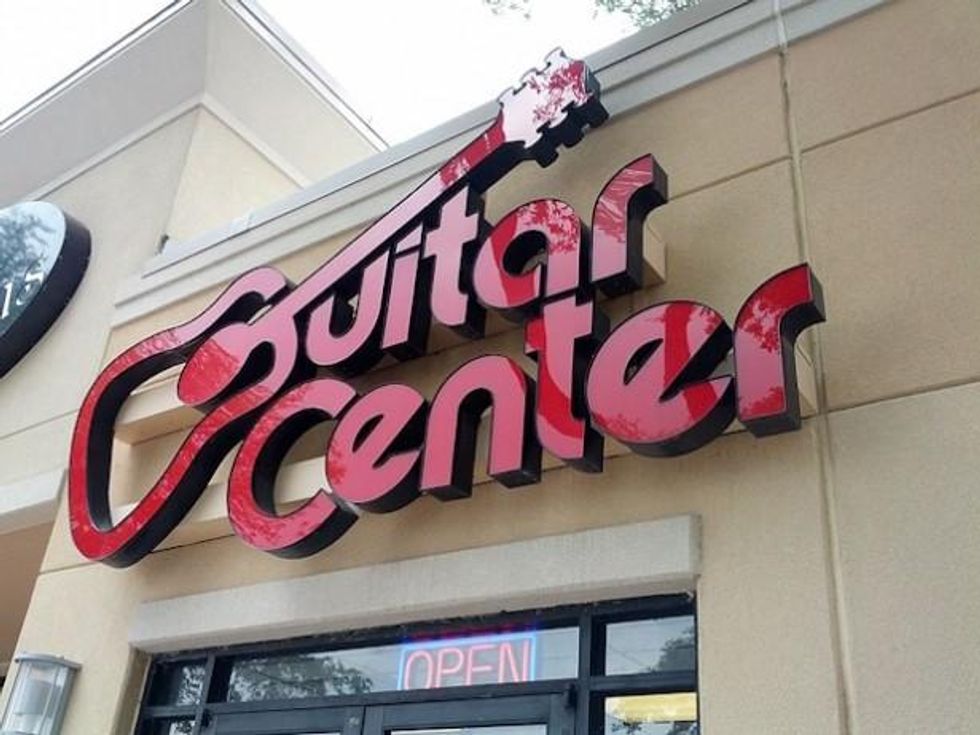Guitar Center Workers Rock the Shop Floor

If your 9-to-5 job revolves around your life's passion, the satisfaction of being surrounded by what you love can offset the daily grind. But such passion is often in short supply in retail work, which is generally defined by the quintessential boring sales job. At Guitar Center, however, one of the country's largest instrument chains, workers' love for music, combined with their disdain for The Man, is driving a valiant campaign for a union.
In several cities, Guitar Center employees have been organizing since late 2012 with the support of the Retail, Wholesale and Department Store Union (RWDSU). In May, they scored their first victory at the flagship store in the West Village, with 57 employees voting to unionize. Then another Guitar Center, in Chicago, unionized in August. As labor organizers reach out to other cities, though, the management, controlled by private equity giant Bain Capital, is reportedly hoping to undercut the union before it recruits more workers at the other more than 200 stores nationwide.
Since Bain took over in 2007, workers say, labor conditions on the sales floor have eroded under a pay structure based on commissions. According to employees, because base pay has started as low as $7.25 an hour, often without paid vacation or sick days, these commissions constitute a major portion of workers' income. But this commission on sales kicks in only after reaching a certain minimum threshold--a system known as "fading." Another major frustration for workers has been a lack of autonomy; they say non-sales duties that the Bain management has heaped on them detract from cultivating sales clients. Moreover, a relatively flat wage structure means workers who work their way up the management chain do not receive comparable pay increases.
The workplace atmosphere has allegedly grown more tense since workers started organizing. In May, Manhattan Guitar Center employee Anim Arnold told Labor Press that management was targeting individual workers as they were gearing up for the groundbreaking union vote.
"They've definitely pulled people aside and said they don't think unions are a good idea," he said. "They say, 'Oh, unions don't have anything to offer. It's not the 1920s. We're not children in coal mines. We're fine.'"
Sure, Guitar Center workers know they're not Dickensian factory children, but they do feel entitled to more dignity at work, not least because they genuinely value their jobs. One employee's testimony, broadcast by Rock4Rights, the Chicago Guitar Center workers' public media campaign, reflects the employees' modest demand: "I love my job, and as of now I can't afford to work here."
The staff's subculture makes them unique among service workers. organizer Phillip Andrews, who's working with the Guitar Center campaign says that a perennial challenge in this largely non-union sector is that "conditions in retail are so bad that nobody really cares about the job that they do have, and even if they did, they have very little expectation that it's going to get any better."
By contrast, while Guitar Center workers may be frustrated with their boss, Andrews adds, they "have an affinity with each other that is unlike the affinity that let's say, Wal-Mart workers might have ... People work at Guitar Center because they love music, and the Guitar Center allows them to have a job that helps pay the bills while allowing them to be around other people who love music, both their co-workers and their customers, and be around musical instruments."
Noting that workers are friends, bandmates, and supporters of each others' music outside of the workplace, he adds, "you get a crowd that is naturally going to stick together... and fight to make this job better, because many Guitar Center workers have said to me, 'This really could be the perfect job if we were just able to fix A, B and C. ... If I could just make ends meet and play my music, I could imagine being here forever."
Another advantage Guitar Center workers have is a cadre of music lovers at their back--which happens to include fans and musicians who have long bristled at corporate commercialism invading the music scene. In addition to their store-by-store organizing, the RWDSU has gathered thousands of supporters through an online petition campaign and won celebrity endorsements from radical rockers like Tom Morello, Billy Bragg and Steve Earle, with a slick YouTube video soundtrack courtesy of Anti-Flag.
As campaign publicity has ramped up, however, the management has reportedly put their own paternalistic spin on the company's culture of camaraderie to deter worker activism. In response to the New York store unionization, Dennis Haffeman, executive vice president of human resources told Rolling Stone that the company strives for "a working environment that our folks love." Referring to the organizing effort, he said, "It's unfortunate that we now have a third party involved.
But organizers remain optimistic. In New York and Chicago, where employees are now actively engaging in talks to establish a fair contract for workers, Andrews says that managers are starting to negotiate with workers in good faith. He's hopeful that despite the company's reported anti-union stance in the past months, this positive attitude will remain consistent at other stores.
Meanwhile, the workers continue their online campaign to gain public support. Because the bureaucratic union-election process generally affords the employer a long timetable for strategically wearing down workers with union-busting campaigns, organizers say that generating strong public pressure on the company--such as the kind of populist energy sparked by parallel grassroots campaigns at fast food chains and in other low-wage, non-unionized sectors--could give workers much-needed leverage against a goliath like Bain. Though Guitar Center stores nationwide may not be unionized for some time, organizers hope that its workers are conducting the prelude to a new wave in retail organizing.